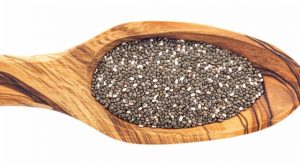All About Chia Seeds for Horses
By Kentucky Equine Research Staff:
Chia seeds are small, round seeds that are generally considered a healthy addition to human diets. The seeds come from the plant Salvia hispanica, which is a member of the mint family and native to parts of Mexico and Guatemala. In humans, chia seeds support cardiovascular and digestive health, reduce inflammation, and help control diabetes, among other benefits, according to various reports.
While the positive effects of chia have yet to be scientifically studied in horses, it is not uncommon for horse owners to supplement equine diets with this “superfood.” Anecdotal benefits of chia seeds for horses include skin and coat health, and digestive and immune support. “The high fat content of chia seeds is the likely source of benefits to skin and coat health, as fat and essential fatty acids contained in the oil support a strong dermal layer and healthy hair coat,” explained Katie Young, Ph.D., a nutritionist for Kentucky Equine Research.
Chia seeds include other nutritional benefits. They feature a complete source of protein, meaning they contain all the amino acids that the body cannot make itself and must be consumed in the diet. Chia seeds are also a rich source of antioxidants, fiber, calcium, phosphorus, zinc, and omega-3 fatty acids, the latter of which is one reason chia seeds have become popular among horse owners. Chia seeds are the richest plant source of omega-3 fatty acids, according to the Harvard School for Public Health.*
The primary omega-3 fatty acid in chia seeds is alpha-linolenic acid, or ALA, which must be converted in the body to the bioactive forms, docosahexaenoic acid (DHA) and eicosapentaenoic acid (EPA). Unfortunately, the conversion rate is not very high. In a scientific review, it was noted that the conversion rate of ALA to EPA and DHA in humans is approximately 8-10%, is likely similar in horses, and supplementation with EPA and DHA directly was suggested as a result.** EO-3, a supplement developed by Kentucky Equine Research, is a sustainable, marine-derived source of EPA and DHA that can easily be added to a horse’s ration.
When chia seeds are soaked, the fiber portion forms a mucilage, which is a sticky, gelatinous substance. The delicate surface of the seed breaks apart easily in the presence of moisture, so there is no need to grind them before consumption. This mucilage is one reason some horse owners opt to feed chia seeds to horses diagnosed with gastric ulcers. The belief is that the mucilage coats the ulcers and supports healing; however, no research supports this claim.
There is no suggested serving size of chia seeds for horses. A typical serving for humans is approximately two tablespoons (30 mL) according to instructions on store-bought chia seeds, so it is reasonable to estimate that this amount is too small for maximum benefits for a 1,100-lb (500-kg) horse. If feeding chia seeds to a horse, soak them and mix with a small amount of soaked forage cubes, pellets, or concentrate (according to the horse’s regular diet) to minimize the risk of the small seeds irritating or getting stuck in the airway. Consult an equine nutritionist for guidance on how to safely add chia seeds to a horse’s diet.
In summary, chia seeds are packed with nutrients and have the potential to be a useful supplement in horse diets. Their high-fat content may support healthy skin and coat, but the proper serving for horses has not been determined. If you’re looking for a source of the essential omega-3 fatty acids EPA and DHA, skip the chia seeds and look for EO-3.
*Harvard Medical School. Chia seed benefits: What you need to know. Harvard Health Publishing.
**Tess, T., and T. Ross-Jones. 2014. Omega-3 fatty acid supplementation in horses. Revista Brasileira de Zootecnia 43(12).











